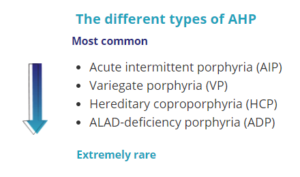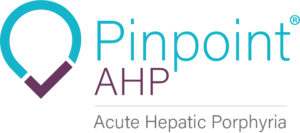 Acute hepatic porphyria (AHP) refers to a family of rare, genetic diseases characterized by painful attacks and, for some patients, chronic symptoms that negatively impact everyday life. While severe, unexplained abdominal (belly) pain is the most common symptom of AHP, occurring in more than 90% of people who experience AHP attacks, people may also experience nausea, vomiting, seizures, anxiety and depression, and pain in their limbs, back or chest. AHP affects people of all races, ethnicities, genders and ages, but most cases are in women between the ages of 15 and 45. In fact, approximately 80% of people with AHP are women.
Acute hepatic porphyria (AHP) refers to a family of rare, genetic diseases characterized by painful attacks and, for some patients, chronic symptoms that negatively impact everyday life. While severe, unexplained abdominal (belly) pain is the most common symptom of AHP, occurring in more than 90% of people who experience AHP attacks, people may also experience nausea, vomiting, seizures, anxiety and depression, and pain in their limbs, back or chest. AHP affects people of all races, ethnicities, genders and ages, but most cases are in women between the ages of 15 and 45. In fact, approximately 80% of people with AHP are women.
In people with a genetic defect for AHP, an enzyme deficiency results in the buildup of toxins called aminolevulinic acid (ALA) and porphobilinogen (PBG), which are released throughout the body. ALA and PBG are harmful to nerve cells and have been associated with AHP attacks and symptoms. Not everyone who has a genetic mutation for AHP will develop symptoms.

Because AHP is rare and its symptoms are similar to more common conditions, it can take a long time for someone to receive an accurate diagnosis. In fact, the journey to diagnosis for someone with AHP can take up to 15 years. Common misdiagnoses include endometriosis and fibromyalgia as well as gastrointestinal disorders like irritable bowel syndrome and appendicitis. Misdiagnosis of AHP can lead to unnecessary treatments, surgeries and hospital stays.
Another challenge with AHP is the stigma some patients may experience. Although severe abdominal pain is a hallmark symptom of AHP, a doctor who is unfamiliar with the disease may not fully understand the cause or severity of the pain and assume the patient is being a “drug seeker.” This stigma is especially problematic for women, whose pain levels have historically been taken less seriously than men’s by doctors, and even more so for Black women, who are about half as likely to be prescribed opioid medicines for abdominal pain in the emergency department than white patients.
Racial and ethnic minorities and other underserved populations are also likely to experience even greater barriers to screening, diagnosis and treatment of rare diseases than for common conditions due to a variety of cultural, socioeconomic, and environmental factors. Delays in diagnosis of AHP attacks can be fatal or can cause long-term or permanent neurologic damage, so an early and accurate diagnosis of AHP is important for anyone living with the condition.
 If you think you might be experiencing symptoms of AHP, it’s important to speak with your doctor. To learn more about AHP, access educational resources and hear stories from people living with the condition, visit Alnylam Pharmaceuticals’ website www.PinpointAHP.com. You can also visit www.AHPPEL.com and request to connect with an Alnylam Patient Education Liaison, who can provide further information about AHP and discuss questions you might have.
If you think you might be experiencing symptoms of AHP, it’s important to speak with your doctor. To learn more about AHP, access educational resources and hear stories from people living with the condition, visit Alnylam Pharmaceuticals’ website www.PinpointAHP.com. You can also visit www.AHPPEL.com and request to connect with an Alnylam Patient Education Liaison, who can provide further information about AHP and discuss questions you might have.
Content sponsored and provided by:

PinpointAHP is a registered trademark of Alnylam Pharmaceuticals, Inc.
© 2021 Alnylam Pharmaceuticals, Inc. All rights reserved.
AS1-USA-00839


